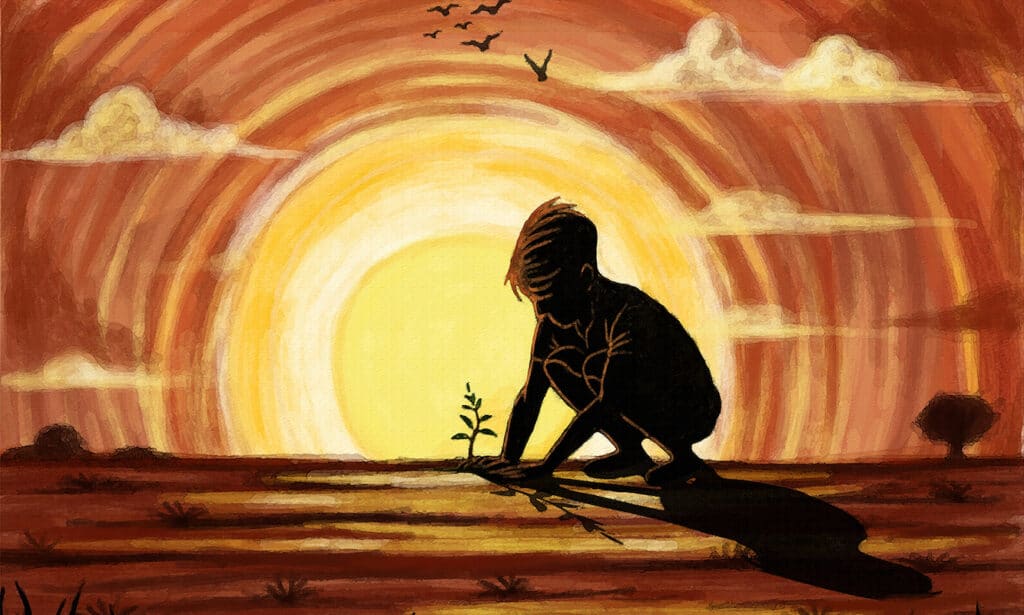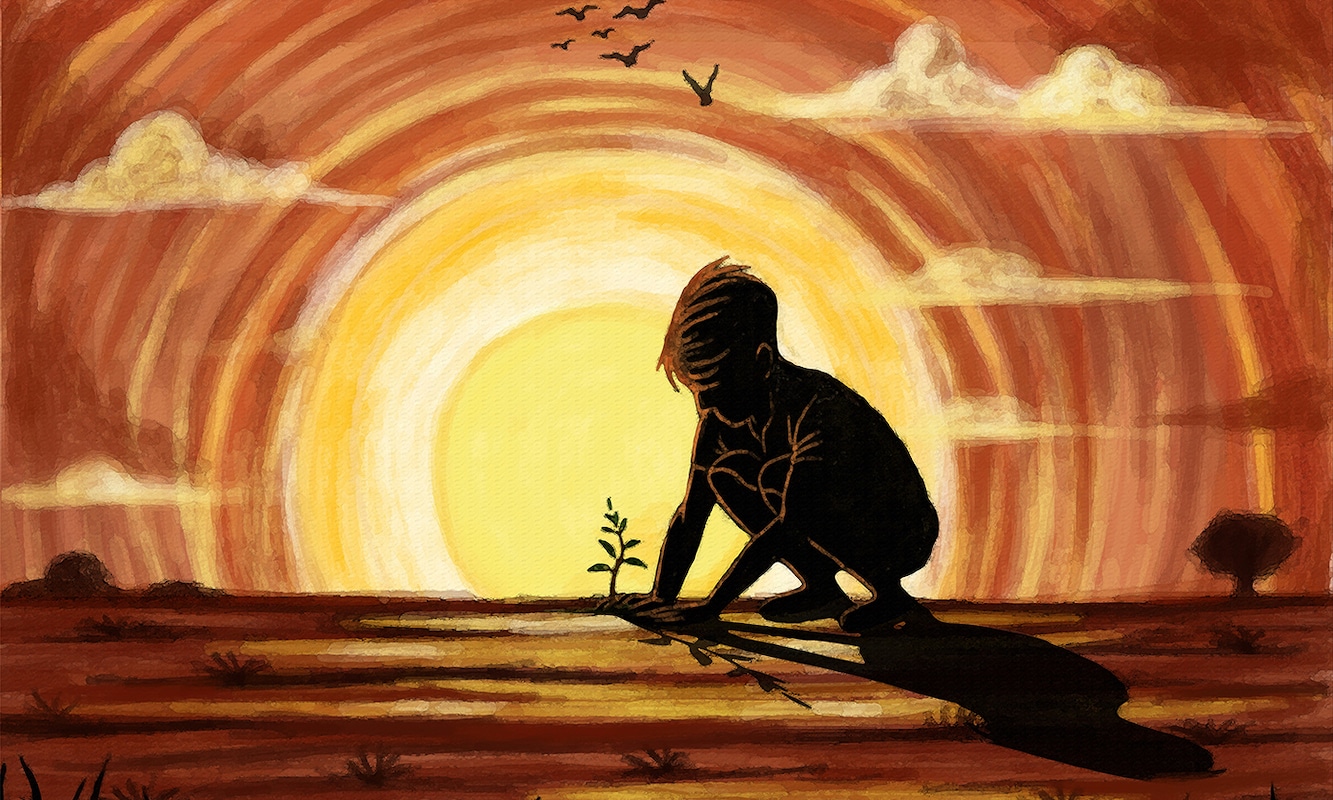What if we stopped pretending? Fatalism versus a Reason for Hope
“There will come a time when you believe everything is finished; that will be the beginning.”
– Louis L’Amour
We are in the age of the Anthropocene. Climate change has compelled us to witness the devastating effects of forced climate disruption making hotter temperatures, rising sea levels, supply scarcity, severe storms, increased drought, health risks, species loss, poverty and subsequent conflict our ill-fated reality. Our presence as human species, and combination of consumption and neoliberalism has dually impacted natural environments to an extensive scope of fragility. In turn, we have undoubtably caused geographical damage and exposed both the earth and ourselves to burning threats in response to current and prospective planetary vulnerabilities. The World Economic Forum, Global Risks Perception Survey 2022-2023 reiterates the above concerns and reinforms readers that climate change remains the world’s greatest risk. The survey brings attention to the top 3 global risks which are fittingly climate related and fall under the category of failing to mitigate, failing to adapt and natural disasters and extreme weather events which disproportionately effect low to middle income regions. To say the survey results are troubling, would be a major understatement.
Fatalism is a concept and at times political philosophy which renders all events mutually predetermined and inevitable. In addition, fatalism is distinct from determinism and can be traced as far back to Ancient Greece. The theory led Stoics to believe that humanity should simply accept what will occur because it is unreasonable and impossible to believe otherwise. Aristotle accepts, “What is, necessarily is, when it is; and what is not, necessarily is or, when it is not.” Stanford’s Encyclopaedia of Philosophy (2022) further examines the depths of this particular attitude and explains “though the word “fatalism” is commonly used to refer to an attitude of resignation in the face of some future event or events which are thought to be inevitable, philosophers usually use the word to refer to the view that we are powerless to do anything other than what we actually do.” Applied to a changing climate, environmental risks could be pronounced as an act of destiny which consequently go beyond mortal or social capacity to solve or control.
Johnathan Franzen, established American novelist and essayist has explored climate change from a fatalistic dimension, one which I admittingly have avoided considering until reading his infamous 2019 opinion essay, “What if we stopped pretending? The climate apocalypse is coming. To prepare for it, we need to admit we can’t prevent it.” His argument can be derived from the title itself which places scientific fact, human denial, hope, and submission on the spectrum of everything environmental orientated media has chosen to ignore. Franzen’s words provoke many what ifs and forces readers to face the indisputable. Franzen relays what I am hesitant to label as fact by asserting that “If you’re younger than sixty, you have a good chance of witnessing the radical destabilization of life on earth – massive crop failures, apocalyptic fires, imploding economies, epic flooding, hundreds of millions of refugees fleeing regions made uninhabitable by extreme heat or permanent drought. If you’re under thirty, you’re all but guaranteed to witness it.” He goes on to declare, “If you care about the planet, and about the people and animals who live on it, there are two ways to think about this. You can keep on hoping that catastrophe is preventable, and feel ever more frustrated or enraged by the world’s inaction. Or you can accept that disaster is coming, and begin to rethink what it means to have hope.” Ultimately, Franzen encourages society to continue doing whatever is possible in aid of what may help future scenarios but similarly wills humanity to adopt “a more balanced portfolio of hopes, some of them longer-term, most of them shorter.” Initially, I struggled coming to terms with the harsh reality of the possibilities evident in Franzen’s writing because it led me to contemplate a world where we consciously decide to accept the circumstance that it’s too late. What would it truly mean if we surrendered to the science of what we cannot achieve or as Franzen assertively puts it, “What if we stopped pretending?” Does letting go of what we can only hope to protect us and giving in to the scepticism of human capabilities mean giving up or accepting fate?
Pearl S. Buck counters climate fatalism and gives reason to believe in its inaccuracy by claiming “fatalism is a false premise. What will be is not necessarily what must be.” Buck’s statement instils a reason for action despite living in the age of the Anthropocene. Solution based media may be one way to diminish Franzen’s pessimism and hostile outlook of human aptitude and move towards embodying the possibilities of Buck’s statement. However, climate change coverage is not always so successful. Media is fundamental in relation to the public’s attitude on climate change as content can involve influential competences and benefit future eco processes and just transitions. The link between climate change and public opinion is one which needs to be healed in terms of critically expanding knowledge foundations and overall significance. Suitably Thomas Hobbes a political philosopher, believed that humans are tragically self-interested, and driven by selfishness that lives deep within our human marrow. Hobbes’ concept of human nature and egocentric DNA proves insightful as to why people may be indifferent to the subject that continues to reach terrifying heights of severity. This seems to be especially accurate in areas that are not directly affected by global warming and climate disruptions. Globally, climate change trends have fluctuated over the years with the topic being described as episodic in relation to media coverage as attention spans are reported to peak during extreme weather events, climate related conferences and targeted features. Following sporadic peaks, interest falls back into old patterns leaving public interest redirected elsewhere. The Covid-19 pandemic hindered this further and justified subsequent instability in coverage but in turn offered a shock to the global psychology and subsequentially presented humanity with a glimpse of what an apocalyptic scenario would imply. Mutually, this proposed a change of pace which allowed us to reflect on our human behaviour in a world that was so desperately asking us to make a change.
Martin Heidegger, German philosopher whose ideas consider science, technology, economics and politics and similarly examine the importance of truth can be directly applied to ineffective coverage as a potential ground-breaking solution. Heidegger explores the “essence of truth” (Heidegger, 1962) which demonstrates what should and should not be included in such a complex and fragile subject. He dismantles the traditional concept of truth in search of its essence, not dismissing tradition but rather taking it apart for a more meaningful and significant definition. He emphasises how truth has a primitive connection to Being and that the phenomenon of truth is primordially linked with the concept itself. The impact of searching for the essence of truth within climate change science and opinion pieces could positively affect topics integrity. Reporting on climate change from a truthful and solution orientated lens may provide reason for hope to encourage culture and instil a collective belief that we can actively strive to protect the world around us and achieve emission reductions at a radical rate. The inclusion of facts is necessary, yet possible solutions are as vital as they ever were to prove to society that a liveable future is indeed possible. So yes, what if we all stopped pretending? We could resign into hopefulness for the future and have faith that there is reason to try and try again.

Illustration by Fanatic Studio/Getty Studio
Sourced from article, ‘Reasons for Hope on Climate Change in 2021‘, by Matthew Hoffman


